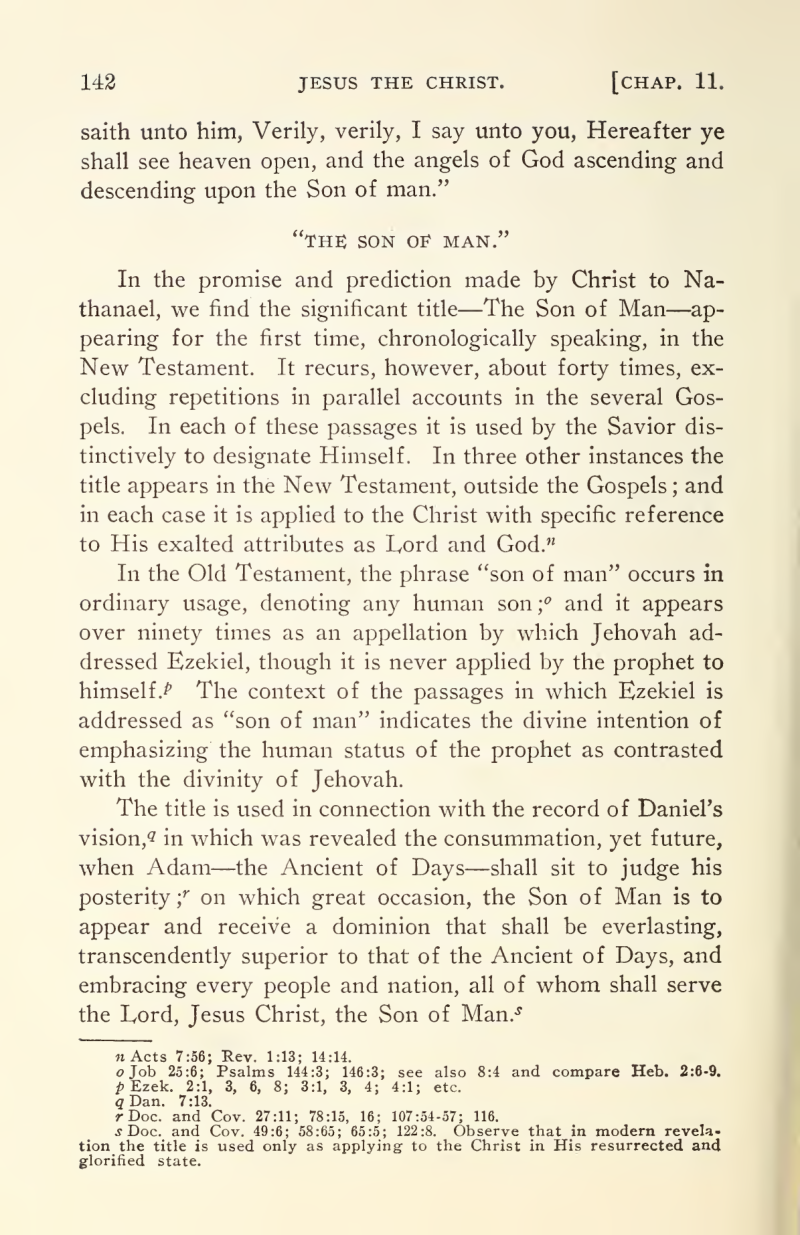James E. Talmage discusses the title "Son of Man"; the Son of Man (Jesus) will receive a dominion superior to the Ancient of Days (Adam).
- Type
- Book
- Hearsay
- Direct
- Reference
James E. Talmage, Jesus the Christ: A Study of the Messian and His Mission according to Holy Scriptures both Ancient and Modern (Salt Lake City: The Deseret News, 1915), 142-44
- Scribe/Publisher
- Deseret News
- Audience
- Reading Public, Members of The Church of Jesus Christ of Latter-day Saints
- Transcription
"The Son of Man."
In the promise and prediction made by Christ to Nathanael, we find the significant title—The Son of Man—appearing for the first time, chronologically speaking, in the New Testament. It recurs however, about forty times, excluding repetitions in parallel accounts in the several Gospels. In each of these passages it is used by the Savior distinctively to designate Himself. In three other instances the title appears in the New Testament, outside the Gospels; and in each case it is applied to the Christ with specific reference to His exalted attributes as Lord and God.
In the Old Testament, the phrase "son of man" occurs in ordinary usage, denoting any human son; and it appears over ninety times as an appellation by which Jehovah addressed Ezekiel, though it is never applied by the prophet to himself. The context of the passages in which Ezekiel is addressed as "son of man" indicates the divine intention of emphasizing the human status of the prophet as contrasted with the divinity of Jehovah.
The title is used in connection with the record of Daniel's vision, in which was revealed the consummation, yet future, when Adam—the Ancient of Days—shall sit to judge his posterity; on which great occasion, the Son of Man is to appear and receive a dominion that shall be everlasting, transcendently superior to that of the Ancient of Days, and embracing every people and nation, all of whom shall serve the Lord, Jesus Christ, the Son of Man.
In applying the designation to Himself, the Lord invariably uses the definite article. "The Son of Man" was and is, specifically and exclusively, Jesus Christ. While as a matter of solemn certainty He was the only male human being from Adam down who was not the son of a mortal man, He used the title in a way to conclusively demonstrate that it was peculiarly and solely His own. It is plainly evident that the expression is fraught with a meaning beyond that conveyed by the words in common usage. The distinguishing appellation has been construed by many to indicate our Lord's humble station as a mortal, and to connote that He stood as the type of humanity, holding a particular and unique relationship to the entire human family. There is, however, a more profound significance attaching to the Lord's use of the title "The Son of Man"; and this lies in the fact that He knew His Father to be the one and only supremely exalted Man, whose Son Jesus was both in spirit and in body—the Firstborn among all the spirit-children of the Father, the Only Begotten in the flesh—and therefore, in a sense applicable to Himself alone, He was and is the Son of the "Man of Holiness", Elohim, the Eternal Father. In His distinctive titles of Sonship, Jesus expressed His spiritual and bodily descent from, and His filial submission to, that exalted Father.
As revealed to Enoch the Seer, "Man of Holiness" is one of the names by which God the Eternal Father is known; "and the name of his Only Begotten is the Son of Man, even Jesus Christ." We learn further that the Father of Jesus Christ thus proclaimed Himself to Enoch: "Behold, I am God; Man of Holiness is my name; Man of Counsel is my name; and Endless and Eternal is my name, also." "The Son of Man" is in great measure synonymous with "The Son of God", as a title denoting divinity, glory, and exaltation; for the "Man of Holiness", whose Son Jesus Christ reverently acknowledges Himself to be, is God the Eternal Father.
- Citations in Mormonr Qnas
The B. H. Roberts Foundation is not owned by, operated by, or affiliated with the Church of Jesus Christ of Latter-day Saints.

